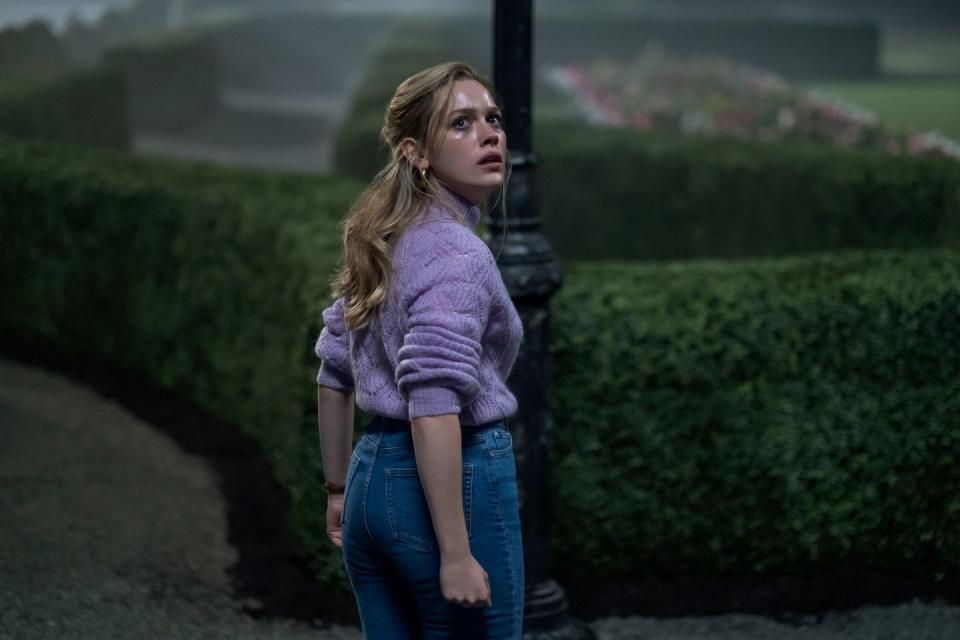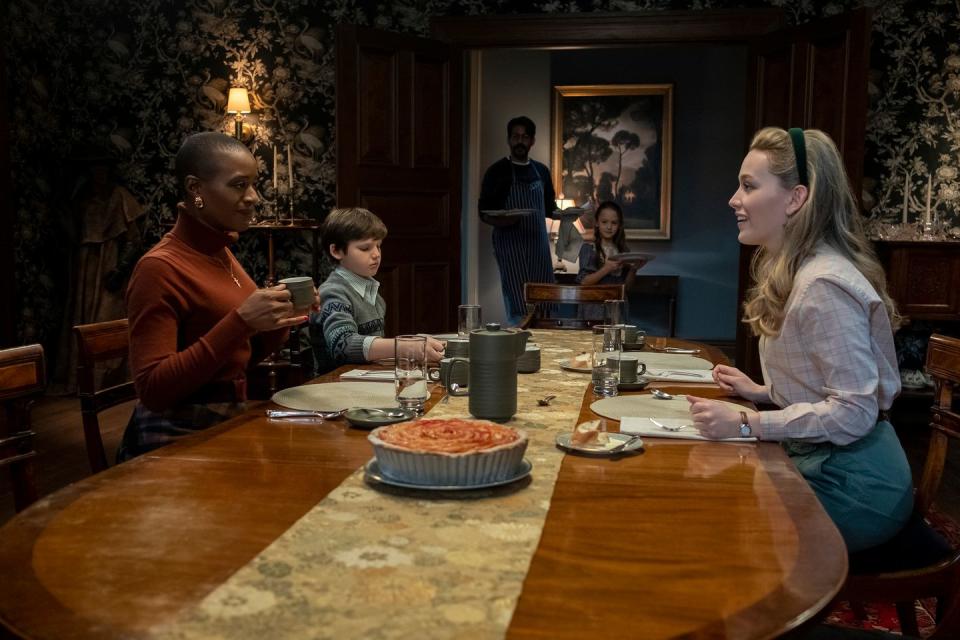The Haunting of Bly Manor's Victoria Pedretti Thinks We Shouldn't Feel Bad for Dani

Victoria Pedretti is at ease. Framed by Zoom's yellow-highlighted rectangle, she's hugging one knee, laughing easily, reclining against the wall. She'll often take a moment to choose the right words, but she's also happy to veer off script.
When I tell her my boyfriend cried at the end of her latest show, The Haunting of Bly Manor (and now I've told the world... oops), she calls him a crybaby and allows herself a chuckle before the obligatory "I’m just kidding." When thinking out loud about the difference between comedy and drama, she starts to consider a point, only to pause before backtracking with a sarcastic "Scratch that. Whatever. I didn’t even say that."
It's a world apart from how Pedretti's Bly Manor character might handle the situation. Dani, bless her, battles anxiety, insecurity, and guilt as much as any paranormal force throughout the series, only to—after a brief few loving years with Jamie—spend eternity as a ghost at the bottom of a lake. Not that her previous character Nell Crain, who played a memorable, neck-breaking role in the first installment in Mike Flanagan's Netflix anthology series, The Haunting of Hill House, fared all that better. (Pedretti argues that we shouldn't feel bad for Nell either, but it's a little hard not to.)
The 25-year-old actress certainly has found a niche for herself in the macabre—a genre that, in step with the world's terrors, is only growing. Since landing her first major role in Hill House, she's appeared opposite Penn Badgley's murderous boyfriend in You's second season, as the surprisingly violent Love Quinn; alongside Elisabeth Moss in Shirley, a biopic about the author behind the gothic novel that inspired Hill House; and as a member of the psychotic Spahn Ranch troupe in gore virtuoso Quentin Tarantino's Once Upon a Time... In Hollywood.
Pedretti acknowledges that she's "got a knack for" darker roles, and enjoys them too. They're "more true," she explains. She does seem like the kind of person who appreciates trueness.
Below, the Bly Manor actress opens up about Dani's sacrifice, explains why the character's queerness isn't a central part of her identity, and offers her own interpretation of the show's ambiguous ending.

To play Dani, did you do something different with your voice? Did I imagine that?
I do something different with my voice for every character. I hope to, that’s part of the work. But yeah, I definitely have a bit of a dialect.
We took awhile to figure out where she was from, and placed her in Iowa. I thought it was really important [to show that in her voice], especially because I know people that are older tend to have stronger dialects. So, somebody coming from the '80s is going to have a stronger dialect than somebody living in the same area today, just because of the way that media has kind of helped kill the dialect. Because it’s not represented, so it’s seen as other. And if you’re a bit of an other, you should probably kill anything that makes that clear to people. [Laughs.]
Otherness is also something that Dani’s dealing with right? I imagine it was a lot harder to be gay back then.
Totally. And I think that there’s something about—she’s not like a New Yorker in London, who finds herself traveling in London. She’s from the Midwest. She is sheltered, not in terms of her experience, but in terms of her exposure and cultural awareness and stuff like that. She would be jumping into the deep end of the pool, choosing to travel throughout Europe spontaneously.
She does have a compelling reason to get away.
And that’s the courageous, open-hearted, like—who the fuck gave her the right? Right? But she’s like, nah, like I need to feed myself. I need to have this experience, because that’s life. That’s what at first really struck me. Who does that? This is an exceptional person, and how do I do that justice?

But the ghosts she's trying to run away from seem to be a different kind or a different origin from the ghosts at Bly Manor—and she defeats them differently.
Well, the first ghost is a manifestation of guilt that she’s running from, and that’s part of what motivates her to leave... Something tragic happens, and she suddenly is filled with this guilt that haunts her. And has a hard time believing that she’s a good person.
And in being in the house, in dealing with the kids, in trying to do all the right things, she finds that it’s still not getting off of her. I think there’s this moment in her where she has to confront it. It’s just, "This guilt is not serving me. It’s just fucking up my life. And I am a good person." She actually confronts it and deals with it, and then she’s able to accept the love that’s in front of her that she couldn’t offer herself—until she could.
The other ghosts are actual beings that are inhabiting the house, the trapped souls of the people that have died there. They mostly are pretty non-confrontational, just very confused—but then there’s the Lady in the Lake, who’s trapping everyone there through sheer will.
Dani deals with [the Lady in the Lake] in a very different way. She ends up having to take on the burden of this creature’s rage in order to free everyone else. She has to make a sacrifice in order to protect the children, so she accepts the ghost’s soul into her being... And then one of her eyes is a different color. [Laughs.]
In that final scene, do you think that’s her hand on Jamie’s shoulder?
I don’t think it’s her actual hand. But I think it’s her presence. I think it’s her love. I think it’s her devotion.
Do you think that it’s sad or sweet that all these years later Jamie’s still leaving the door open?
It’s both, right?! I really hope that Jamie and Owen can find love again, you know, but I think a love as big as they both experienced just leaves a huge fucking impact. It’s very difficult to match what both of them have had. Even if they do find love again, that’s never going to go away, that imprint.
I think life is really sad and sweet. That’s just kind of how it is, and I appreciate that [showrunner] Mike [Flanagan] has this devotion to showing the duality within that. He won’t let us get lost in tragedy, and he won’t let us get lost in the fantasy.

I mean, I do think that your character fares a little better in this season, compared to Hill House's Nell Crain. Or no?
No, I don’t think so. I think Nell has a great love, too. Nell gets to experience a beautiful love that lasts with her. I think both of them have a lot of tragedy, and also have a lot of good. I don’t feel like we need to feel sorry for them, you know? It just, it is what it is. The story’s been written before it begins. It was never going to go another way.
You’ve been doing a lot of dark shows. Is that an area you want to stay in, or is that hard for you sometimes to get in that headspace?
Yeah, I would definitely love to venture outside of it. But I also really enjoy it, and I got a knack for it. I’m ready to go there, and I don’t see it as, because I’m doing sad shows, it’s sad. We do have a lot of fun on set, we maintain a great sense of levity on all of the tragic shit I’ve done. I mean you kind of have to do that.
Mike had a tendency on the first season to be like—we’d be shooting a scene, like me and Jordane [Christie, the actor who played Arthur] dancing at the wedding, and he’d be like, [mimics nudging] “They both die. Let us not forget, they both die.” And it was that grounding within the places of joy, and then within the dark moments finding moments to laugh. You know? You can fall over trying to be scared of a ghost and fall in a way that just looks wildly unrealistic and it’s funny!
So yeah, I want to explore beyond that, but I have really enjoyed the work that I’ve done so far. And I do like those spaces. I think it’s more true.
I know the internet made a lot of your naming both Antonio Banderas and Catherine Zeta-Jones as your celebrity crushes, and I'm guessing that they’re going to be excited about your playing a queer character in Bly Manor. But I know you've said that it shouldn't be a big deal that you named those people—do you feel the same way about Dani’s relationship?
Yeah. Very much so. She’s clearly not straight. And that’s where it ends; I don’t think we should be able to make any assumptions beyond that. That’s it. She’s loving who she’s loving.

I mean their relationship is pretty adorable.
Yeah. I… I love them. They really met their match.
So—
Like we don’t know—I always thought Nell was queer, probably. You know, she marries a man, that doesn’t mean that she… Right? Why are we making—we don’t know her life. And it’s not relevant.
Yeah, totally.
In this situation within Dani’s life it becomes relevant... And [for Nell] it’s still relevant, but it’s not relevant to that story in the perspective from which it's told.
And we’re in a place, hopefully, where it doesn’t have to be a character’s entire point. It can be incidental.
Yes! Yeah, I mean, everybody sees themselves differently. For Dani, I don't think her queerness is any sort of ultimate defining factor. That’s not going to be true for every character; some characters do really relate to their queerness and their queer community in a way that is defining for them. It just depends on the character.
You Might Also Like


